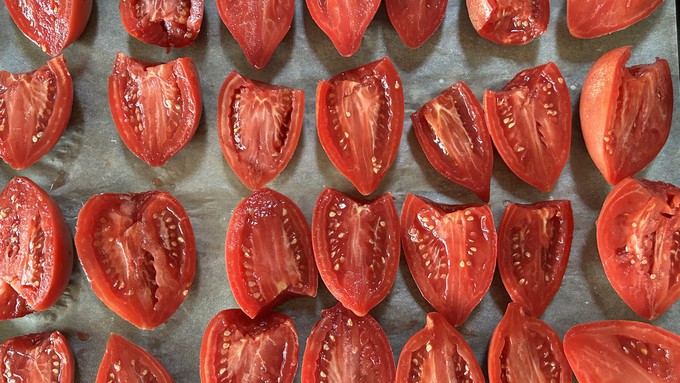
Advice for the vegetable garden, orchard, roses -- and late-summer produce

Washed, cored and sliced, these Rugby tomato halves at this point can be frozen or, with maybe a little salt or olive oil added, roasted. Check out the tomato-saving tips in the Garden Basics podcast. Kathy Morrison
If you were able to attend the most recent Open Garden Day, you witnessed the flurry of activity by the UCCE master gardeners staffing the Fair Oaks Horticulture Center. It's nearly autumn, which is an important transition time for backyard gardening.
"Farmer Fred" Hoffman, himself a lifetime master gardener, was on site for his popular "Garden Basics" podcast. He talked with some of the FOHC experts about how they're preparing the gardens for the cooler days ahead. Oh, and he talked to me, too, about one of my favorite topics: tomatoes, and what to do with them as the season winds down.
If you want to skip ahead to the podcast, you can find it here: https://gardenbasics.net/
Otherwise here's a quick recap of the master gardeners and their topics:
-- Gail Pothour, in the Vegetable Garden, discusses changing over the vegetable beds, including restoring the soil in advance of planting cool weather vegetables. She notes that the melon vines were being trimmed back, to focus the plants' energy on ripening the last melons of the season. She also adds a tip on growing a quick cover crop: buckwheat.
-- Quentyn Young, a project leader in the Orchard, talks about finishing up the summer pruning, the trees' changing water needs, and the maintenance of the citrus trees. He notes that the Orchard Team is going to try something new next year: growing bananas!
-- Anita Clevenger, who is an old-rose expert and a project leader in the Water-Efficient Landscape, discusses rose care and maintenance for this time of year. She covers deadheading, rose hips, pruning schedules, and the use of alfalfa pellets, among other topics.
My segment primarily concerned ways to save what's left of the tomato harvest. Hint: It helps to have some room in your freezer.
Separately, Fred talks to retired horticulture professor Debbie Flower about "When do pesticides expire?" It includes particular discussion about the shelf life of Bt (bacillus thuringiensis), a bacterium used to kill caterpillars.
Fred Hoffman's garden advice also is found in "Beyond Basics: The Garden Basics with Farmer Fred Newsletter." In another look at fall garden preparation, he posed this question to master gardener Susan Muckey: If the worms in your vermiculture system could talk, what would they tell you this time of year? Susan's a vermicomposting specialist and she has a binful of excellent advice.
Just a note: The next Open Garden Day at the Fair Oaks Horticulture Center is Wednesday, Oct. 11, from 9 a.m. to noon, 11549 Fair Oaks Blvd., Fair Oaks. It's a great opportunity to talk to the master gardeners in person.
Comments
0 comments have been posted.Sacramento Digs Gardening to your inbox.
Food in My Back Yard Series
May 6: Maintain soil moisture with mulch for garden success
April 29: What's (already) wrong with my tomato plants?
April 22: Should you stock up on fertilizer? (Yes!)
April 15: Grow culinary herbs in containers
April 8: When to plant summer vegetables
April 1: Don't be fooled by these garden myths
March 25: Fertilizer tips: How to 'feed' your vegetables for healthy growth
March 18: Time to give vegetable seedlings some more space
March 11: Ways to win the fight against weeds
March 4: Potatoes from the garden
Feb. 25: Plant a fruit tree now -- for later
Feb. 18: How to squeeze more food into less space
Feb. 11: When to plant? Consider staggering your transplants
Feb. 4: Starting in seed starting
Sites We Like
Garden Checklist for week of May 11
Make the most of the lower temperatures early in the week. We’ll be back in the 80s by Thursday.
* Plant, plant, plant! It’s prime planting season in the Sacramento area. Time to set out those tomato transplants along with peppers and eggplants. Pinch off any flowers on new transplants to make them concentrate on establishing roots instead of setting premature fruit.
* Direct-seed melons, cucumbers, summer squash, corn, radishes, pumpkins and annual herbs such as basil.
* Harvest cabbage, lettuce, peas and green onions.
* In the flower garden, direct-seed sunflowers, cosmos, salvia, zinnias, marigolds, celosia and asters. (You also can transplant seedlings for many of the same flowers.)
* Plant dahlia tubers.
* Transplant petunias, marigolds and perennial flowers such as astilbe, columbine, coneflowers, coreopsis, dahlias, rudbeckia and verbena.
* Keep an eye out for slugs, snails, earwigs and aphids that want to dine on tender new growth.
* Feed summer bloomers with a balanced fertilizer.
* For continued bloom, cut off spent flowers on roses as well as other flowering plants.
* Add mulch to the garden to maintain moisture. Mulch also cuts down on weeds. But don’t let it mound around the stems or trunks of trees or shrubs. Leave about a 6-inch-to-1-foot circle to avoid crown rot or other problems.
* Remember to weed! Pull those nasties before they set seed.
* Water early in the day and keep seedlings evenly moist.